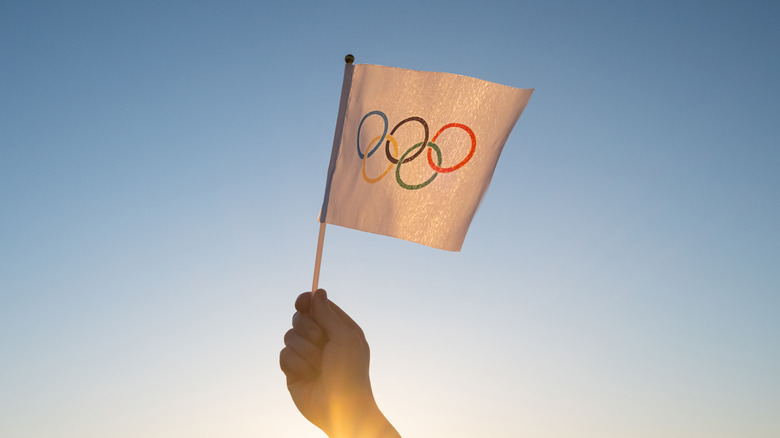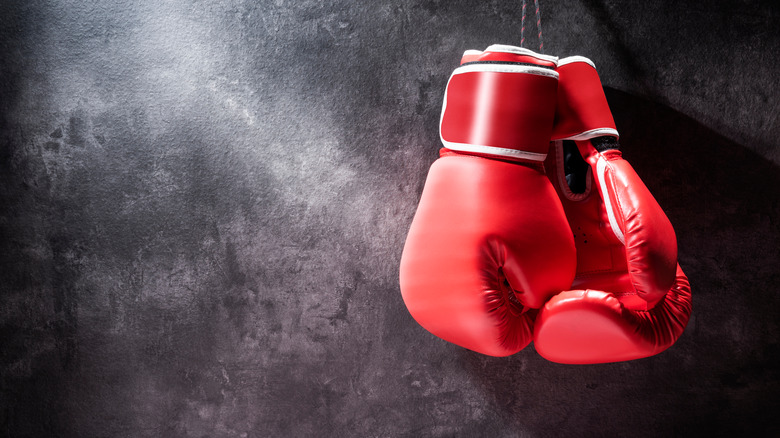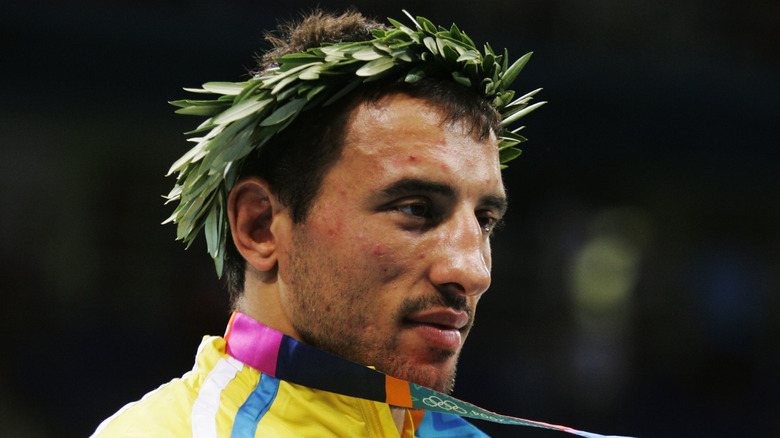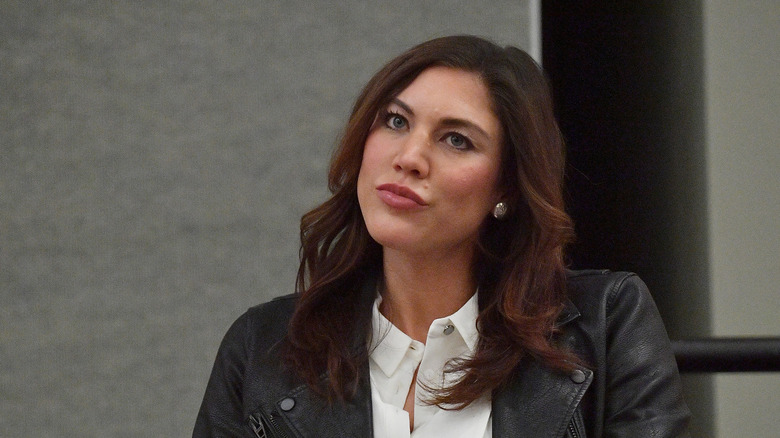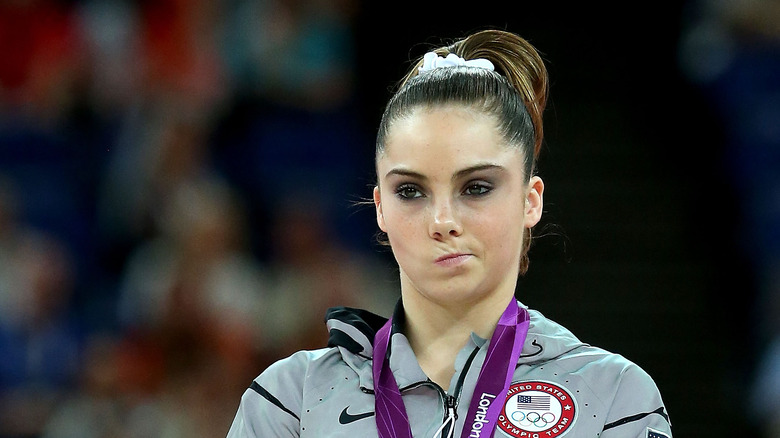Olympic Athletes Who Lost It On Live TV
One of the benefits to watching sports live is that there is no editing. Whatever happens, happens, and it's captured by the cameras, disseminated to the audience, and archived for posterity. That means that if a fan or an athlete acts the fool, it's going to be seen by at least some people, possibly millions, when it happens. And then, in this day and age, it's going to be repeated, over and over again, on the news and on YouTube.
However, athletes are people, too, and sometimes their emotions get the better of them. This is especially true of the Olympics. Men and women who have devoted most of their lives to the hope of competing there take what may be their one and only chance at greatness. When things go wrong, it can get ugly. Unfortunately, the unblinking eye of the news camera catches people at their best and sometimes not quite best. And it's happened more than once.
Byun Jung-il sat still for an hour in protest of a bad call by a referee
At the Summer Olympics in 1988, hosted by Seoul, bantamweight boxer and hometown hero Byun Jung-il was competing against Bulgarian Aleksandr Hristov. The referee of the match, Keith Walker of New Zealand, penalized Byun two points for headbutting, according to The New York Times, resulting in the match being awarded to Hristov.
Byun protested by simply sitting down on the floor of the ring and doing nothing — for the next 67 minutes, while NBC Sports cameras dutifully recorded his protest, as the Iconic Photos blog reported. Byun's protest lasted so long that officials turned out the lights in the building and left the boxer sitting alone in the darkness.
While Byun's protest was downright placid, the same couldn't be said of the rest of his team. As the Times reported, his coaches attacked the ref, throwing punches, one of which actually made contact with the official. Eventually, police were called in to clear the ring. (The incident is posted on YouTube.) ”The organizing committee will have to answer to us as to how this could happen,” said Jerry Shears of Canada, an executive committee member of the International Amateur Boxing Association, at the time.
Ángel Matos roundhouse-kicked a referee
Twenty years later was another case of a combat sport resulting in combat against the referee. At the 2008 Beijing Summer Olympics, Cuba's Ángel Matos was competing against Kazakhstan's Arman Chilmanov in Taekwondo. As The Washington Post reported at the time, Matos suffered an injury and, as the rules allowed, took a brief break while he awaited medical attention. The rules allowed for a one-minute break; after 40 seconds, Swedish referee Chakir Chelbat warned the competitor that his allotted break time was running out. When the 60 seconds had passed without Matos having returned to the ring, Chelbat ruled that Matos had resigned and awarded the bout to the Kazakh. An enraged Matos responded by pushing a judge, then pushing Chelbat and delivering a roundhouse kick to his face (via YouTube).
Chelbat would require stitches to his mouth for the injury he sustained. Matos, however, suffered much worse: Within hours, he'd been banned from international competition for life, and his name was struck from the record of that year's Olympiad, as The Associated Press would later report. "This is an insult to the Olympic vision, an insult to the spirit of taekwondo and, in my opinion, an insult to mankind," said World Taekwondo Federation spokesperson Yang Jin-suk at the time, via The Washington Post.
Ara Abrahamian left his bronze medal on the floor and walked away
Another ugly incident to come out of Beijing in 2008 involved Armenian-Swedish Greco-Roman wrestler Ara Abrahamian, who was competing for Sweden. As Expressen reported, Abrahamian was participating in the semi-finals against Italian Andrea Minguzzi when the judge withdrew a point he'd awarded to the Swede and instead gave it to the Italian, over what Abrahamian and his team believed was a minor technicality. The Swedes protested and demanded that officials review video of the bout; they declined. That put Abrahamian in the position of having to compete not for the gold or silver in the final, but for the bronze, which he won.
At the medal ceremony, photos of which can be seen on YouTube, Abrahamian politely shook the hands of the presenter and his fellow competitors, then placed the medal on the floor and walked away, as Reuters reported.
What followed was a series of hearings and rulings that at one time resulted in Abrahamian being banned from competition for life. That ruling was eventually overturned, as Expressen noted in a follow-up report.
Hope Solo gave an interview while still under the influence
Some of the women of the United States Women's National [Soccer] Team have been known to, for lack of a better turn of phrase, play by their own rules. For example, Brandi Chastain famously got tongues wagging when, on making a game-winning kick that netted her team the championship in 1999, she tore off her shirt in celebration.
The women's team had much to celebrate in Beijing in 2008. Following their gold medal win, during which goalkeeper Hope Solo made a number of dramatic saves that undoubtedly helped her team win, the team decided to knock back a few tall, cold ones. However, as USA Today reported, she let the party go a little too long, and by the following morning, American news networks were keen to talk to her, even though she was still intoxicated.
"When we were done partying, we got out of our nice dresses, got back into our stadium coats and, at 7 a.m. with no sleep, went on the 'Today' show drunk," she said. Portions of that interview can be seen on YouTube.
McKayla Maroney became a meme
For an Olympic athlete who just won a silver or a bronze medal, as opposed to the gold, it can be a difficult thing to stand on the podium during the ceremony and be polite and respectful while trying to hide their disappointment. In London in 2012, U.S. gymnast McKayla Maroney took silver, and tried valiantly — and failed — to mask her frustration. As the cameras rolled, Maroney was caught making a pained smirk, as can be seen in the image above. The image then became a meme, with the caption "McKayla is not impressed," and soon the California teenager had become a thing, perhaps for all the wrong reasons.
As Huffington Post would report, when McKayla was given the chance to visit the White House, then-President Barack Obama gently mocked her viral photo. In a classic moment of "I'm laughing with you, not at you," the POTUS himself posed for a photo with the gymnast, while both recreated the pained grin that made McKayla famous.
